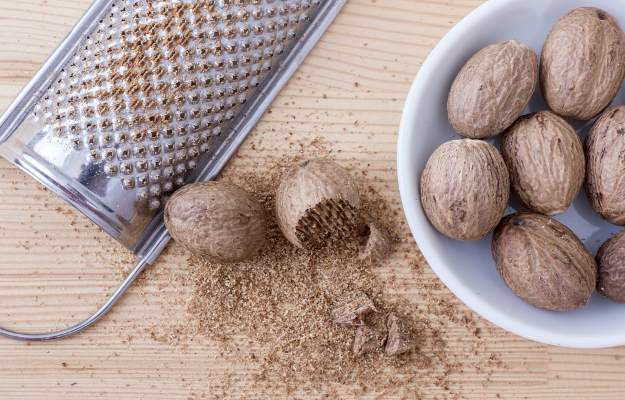Nutmeg, popularly known as Jaiphal, is the seed of several species of Myristica fragrans. The tree is majorly cultivated for two spices which are extracted from its fruits, i.e. mace and nutmeg. The seed of the fragrant nutmeg tree is ground to powder to create the spice called nutmeg. The nutmeg tree produces yields thrice in a season. After harvesting, the kernel is sun-dried for several weeks. After it is dried completely, the shells are opened to remove the nutmeg skin.
The spice has a sweet taste and a peculiar pungent fragrance. It is a widely popular spice and is famous for its usage in baked goods, puddings, beverages, vegetables, meat and potatoes. The essential oils derived from leaves and barks of the tree and nutmeg butter are also widely used. The essential oils from nutmeg are used in the cosmetic industry, in toothpaste and also are used as an ingredient in some cough syrups. On the other hand, nutmeg butter is used as an industrial lubricant and as a substitute for cocoa butter.
The tree of nutmeg is an evergreen and native to the Moluccas or the Spice Islands of Indonesia. In India nutmeg is grown in certain areas in southern states of Kerala, Tamil Nadu and Karnataka also known as Malabar region in ancient times. Apart from Indonesia and India, nutmeg is also grown in many tropical regions that include China, Malaysia, Taiwan, the Caribbean Islands, Sri Lanka and South America.
About three-quarters of overall nutmeg produced in the world come from Indonesia making it the largest producer of nutmeg in the world. Did you know that the national flag of Grenada which was adopted in 1974 shows an open nutmeg fruit? Also, the nickname for Connecticut is "The Nutmeg State" or "Nutmegger" based on the belief that the traders there extracted nutmeg from wood.
Nutmeg is considered as one of the treasures of Mother Nature. It is an exotic spice and can take the dish to a whole new level by adding just a pinch of it. Apart from this, nutmeg has various other benefits for health, skin and is known for its medicinal properties. Indian Vedic literature recommends nutmeg for bad breath, headaches and fever. Arabian literature mentioned its use as an aphrodisiac and a stomach medicine. Nutmeg is also believed to boost immunity and keep infections away. It is also good for nerve and blood vessel health.
Some basic facts about Nutmeg tree
- Botanical Name: Myristica fragrans
- Family: Myristicaceae
- Sanskrit Name: Jatiphala
- Parts used: Fruits, seeds
- Native Region: Nutmegs originated in the Indonesian rainforest. It is also produced in India, Malaysia, Sri Lanka, Caribbean Islands, etc.

































